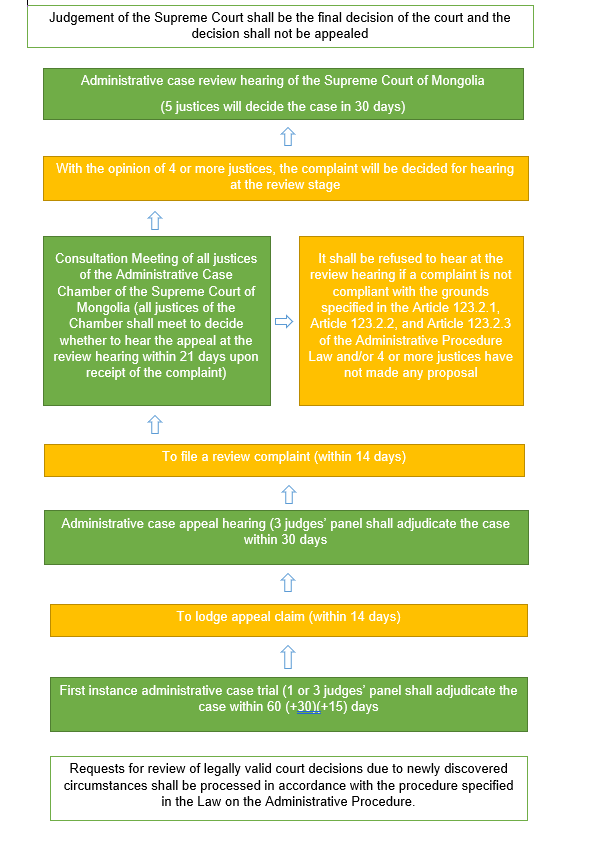
Article 123-127 of the Chapter 13 of the Law on Administrative Procedure of Mongolia shall be adhered to adjudicate an appeal at the cassation session.
Article 123. Lodging an appeal in the cassation procedure
123.1.The case participants, their representatives and attorneys shall have the right to lodge an appeal in the cassation procedure against the appellate court judgment provided in Article 119 of this law.
123.2.An appeal in the cassation procedure shall be lodged with the Supreme Court of the State on the following grounds:
123.2.1.the first and appellate instance courts applied the law inconsistently;
123.2.2.a serious violation of due process affected the court decision;
123.2.3.the court interpreted and applied the law differently from the official interpretation of the Supreme Court.
123.4.In accordance with Article 48.1 of this law, the person lodging an appeal in the cassation procedure shall pay the state stamp duty in advance.
123.5.If the person who lodged an appeal in the cassation instance withdraws its appeal before the session of the cassation instance court, it shall be considered no claim is lodged, and the judge shall issue an order; but if it withdraws during the court session, the case proceedings in the cassation instance shall be dismissed, and the court shall issue a judicial panel decision, and the stamp duty shall be refunded.
123.6.If the case participants have settled, or the plaintiff withdraws its claim, or the defendant admits to the plaintiff's claims after the appeal in the cassation procedure, the decision of the first instance court and the appellate court judgment shall be annulled and the case shall be dismissed. In this case, the stamp duty is not refunded.
123.7.If a case participant, their representative, or attorney has exceeded the period specified in Article 119.5 of this law for a justifiable reason, they shall file a request for restitution with the relevant evidence to the first instance court; the judge shall decide whether to satisfy the request within the scope of the documents enclosed to it by issuing an order.
Article 124.Receiving an appeal in the cassation procedure
124.1.An appeal lodged in the cassation procedure shall be received by the court adjudicated the case in the first instance procedure, and the procedures specified in Article 114 of this law shall be implemented. The case participants, their representatives and attorneys shall have the right to make a statement on the appeal.
124.2.The court that received the appeal shall deliver the case enclosed with the receipt of stamp duty payment and the appeal by the case participant to the Supreme Court of State within three days from the receipt of the appeal in the capital and 14 days for local territory.
124.3.The cassation instance court shall discuss the appeal within 21 days after receiving the complaint by its meeting of all justices, and if four or more justices vote that the case shall be discussed in the cassation instance court hearing, and the relevant resolution shall be issued.
124.4.In accordance with Article 124.3 of this law, if a resolution is not made to discuss the appeal at the cassation instance court hearing, it shall be deemed rejected, and the relevant resolution shall be issued, and the stamp duty shall be refunded.
124.5.The resolution provided in Articles 124.3 and 124.4 of this law shall come into force upon the signature of the justices. The resolution shall be final and shall not be appealed.
124.6.The case participants, their representatives and attorneys shall not participate in deciding whether the appeal be discussed at the cassation instance court hearing.
Article 125.Case proceedings period
125.1.The case shall be adjudicated in the cassation instance court hearing within 30 days after the resolution has been made to discuss the case at the court hearing.
Article 126.Notifying the case participants
126.1.The case participants, their representatives and attorneys shall be notified when and where the cassation instance court hearing will be held.
126.2.Being notified of the court session schedule notwithstanding, nonappearance at the court session shall not prevent the case proceedings.
Article 127.The cassation instance court session
127.1.The case shall be adjudicated by the five justices of the Supreme Court of the State in the cassation procedure, and the decision shall be made in accordance with the procedure specified in Article 105.1 of this law and handed down whether the appeal is satisfied. The decision shall be issued within 30 days from the end of the court session, and the Judge Council of the court may extend the period once by up to 30 days.
127.2.The court shall adjudicate a case in the cassation procedure and issue a judicial panel decision as follows:
127.2.1.to uphold the decision and appellate court judgment and to dissatisfy the appeal;
127.2.2.to change the decision and appellate court judgment;
127.2.3.to annul the appellate court judgment partly or wholly and to uphold the decision all or change the decision;
127.2.4.to annul the decision and the appellate court judgment and to dismiss the case, or to satisfy the claim;
127.2.5.to annul the decision and the appellate court judgment and return the case to the first or appellate instance court for re-trial.
127.3.In the judicial panel decision, the summary of the determination part of the first instance court decision and the appellate court judgment, the legal grounds for the appeal and the judicial panel decision shall be written, and signed by the members of the judicial panel.
127.4.The judicial panel decision becomes effective after being signed by the members of the judicial panel. In the judicial panel decision, the summary of the determination part of the first instance court decision and the appellate court judgment, the grounds for the appeal and the judicial panel decision shall be respectively written.
127.5.The cassation instance court resolution shall be the final court decision and no appeal shall be lodged against the judicial panel decision.
127.6.The judicial panel decision of the cassation instance court shall be delivered to the case participants, their representatives, and attorneys within a week after it becomes effective.